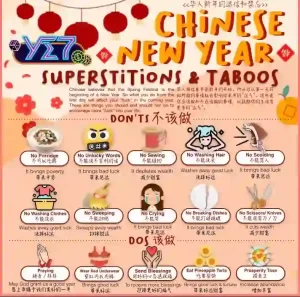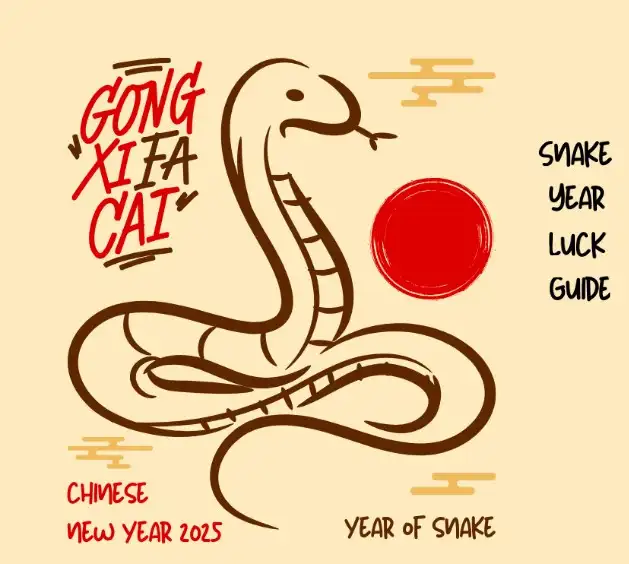Did you know that sweeping your floor on Chinese New Year could sweep away your good luck? 🧹 Or that wearing red can attract prosperity?
❤️ Chinese New Year is just around the corner, and it’s a time filled with fascinating traditions, including a long list of do’s and don’ts! 🐉 Whether you’re Filipino-Chinese or simply curious about this vibrant celebration, this guide will help you navigate the dos and don’ts, ensuring you welcome the Year of the Snake 🐍 with good fortune and avoid any unintentional bad luck.
Get ready to discover the secrets to a prosperous Lunar New Year! ✨


Advertisement:

🐍 Is 2025 Your Lucky Year? Unveiling Your Chinese Horoscope for the Year of the Wood Snake
Table of Contents
Chinese New Year in the Philippines: A Celebration of Shared Culture
Chinese New Year is a significant event in the Philippines, celebrated not only by the Filipino-Chinese community but also by many Filipinos who have embraced its traditions. The close ties between the two cultures have led to a unique fusion of customs, making Chinese New Year in the Philippines a truly special occasion. It’s a testament to the country’s rich and diverse cultural landscape.
The Do’s and Don’ts: Navigating Chinese New Year Taboos and Superstitions
Many Filipinos, regardless of their ancestry, are familiar with and even follow some of the common Chinese New Year taboos and superstitions. These practices, passed down through generations, are believed to influence one’s fortune in the coming year. Here’s a comprehensive guide to help you navigate the Lunar New Year like a pro:
Taboos: Things to Avoid for a Lucky Year 🚫
| Category | Taboo | Explanation |
|---|---|---|
| Cleaning | Avoid sweeping, dusting, or taking out the trash on New Year’s Day. | This is believed to sweep away or discard the good luck that has just entered the home. |
| Sharp Objects | Minimize the use of knives, scissors, needles, and other sharp objects. | Sharp objects are thought to “cut” your good fortune or sever relationships. |
| Washing Hair | Some people avoid washing their hair on the first day of the new year. | This is believed to wash away good luck. |
| Negative Words | Refrain from using words related to death, sickness, poverty, or anything negative. | Maintain a positive atmosphere and attract good fortune by using auspicious language. |
| Breaking Things | Be extra careful not to break anything, especially dishes or mirrors. | Breaking objects is considered very unlucky and could bring misfortune. |
| Certain Gifts | Avoid giving gifts like clocks, shoes, handkerchiefs, or anything in sets of four. | Clocks symbolize time running out; shoes sound like words for “evil” or “rough”; handkerchiefs are associated with funerals; the number four sounds like the word for “death” in Chinese. |
| Borrowing/Lending | Settle debts before the new year and avoid borrowing or lending money during the celebrations. | This is believed to ensure financial stability and avoid starting the year with debts or financial burdens. |
| Eating Porridge | Traditionally, porridge is associated with poverty. | Some people avoid it during the new year to symbolize prosperity. |
| Crying 😭 | It is believed that crying during the new year will set a sad tone for the rest of the year. | Some people, especially the elders, discourage crying and encourage being happy to ensure a joyful year. |
| Using foul language or arguing | This is seen as disruptive and can bring negative energy into the new year. | Similar to avoiding negative words, maintaining a harmonious environment is emphasized. |
| Taking medicine | Unless absolutely necessary, taking medicine is avoided as it might symbolize illness for the coming year. | This is rooted in the belief of starting the year healthy and avoiding any signs of sickness. |
| Wearing black or white clothing | These colors are traditionally associated with mourning. | Opt for brighter colors, especially red, to symbolize joy and good fortune. |
| Killing or harming living beings | It is believed that killing or harming living beings can bring about misfortune and negative energy. | Many will avoid any form of killing, even fishing or hunting, and opt for kindness to all living things. |
| Sweeping outwards | If you must sweep, make sure to sweep inwards to keep the luck within the house. | Symbolizes keeping the good fortune inside and not sweeping it away. |
Superstitions: Practices to Attract Good Fortune 👍
| Category | Superstition | Explanation |
|---|---|---|
| Wear Red | Wear red clothing and accessories. | Red is considered the most auspicious color, symbolizing good luck, prosperity, and warding off evil spirits. |
| Decorate in Red | Adorn your home with red lanterns, Chinese couplets with lucky messages, and other red decorations. | Red decorations create a festive atmosphere and attract positive energy. |
| Give/Receive Ang Pao | Give and receive red envelopes filled with money. | This symbolizes the sharing of blessings and good fortune. Elders typically give ang pao to children and unmarried individuals. |
| Eat Lucky Foods | Consume traditional Chinese New Year foods like tikoy, dumplings, spring rolls, noodles, and round fruits. | Each food carries symbolic meaning, representing progress, wealth, longevity, and completeness. |
| Make Noise | Light firecrackers or create noise by banging pots and pans (where permitted). | The loud noises are believed to scare away evil spirits and bad luck, ensuring a fresh start to the new year. |
| Display Lucky Symbols | Place images of the year’s zodiac animal (Snake in 2025), the money god, and gold ingots around your home. | These symbols are believed to attract good fortune and prosperity. |
| Open Doors and Windows | Open doors and windows on New Year’s Eve or during the day. | This allows the old year’s energy to leave and welcomes the new year’s energy and luck into your home. |
| Visit a Temple | Offer prayers and incense at a temple. | This is a way to show respect to deities and ancestors and to ask for blessings for the new year. |
| Family Reunion Dinner | Gather with family for a special meal on New Year’s Eve. | This is considered the most important meal of the year, symbolizing family unity and togetherness. |
| Stay Up Late on New Year’s Eve | Stay up late to bid farewell to the old year and welcome the new one. | It is believed that staying up late helps to ensure longevity for one’s parents. This practice is known as Shou Sui. |
| Pay Off Debts | Settle any outstanding debts before the New Year. | This symbolizes starting the new year with a clean slate and not carrying over burdens from the past. |
| New Clothes | Wear new clothes on New Year’s Day. | This represents a fresh start and new beginnings. |
Chinese New Year in the Philippines: A Unique Celebration
In the Philippines, Chinese New Year is a vibrant and widely celebrated event. You’ll find:
- Malls and businesses adorned with festive decorations. 🛍️
- Special sales and promotions in many stores. 💰
- Dragon and lion dances performed in various locations. 🐲
- Families enjoying Chinese food, either at home or in restaurants. 🍜
- The Filipino-Chinese community sharing their traditions with the wider public.
Frequently Asked Questions (FAQs)
When is Chinese New Year 2025?
Chinese New Year 2025 falls on January 29th, 2025. It will be the Year of the Wood Snake.
Is Chinese New Year a public holiday in the Philippines?
Yes, it is usually declared a special non-working holiday in the Philippines. The official announcement usually comes from the Office of the President.
What is the best place to celebrate Chinese New Year in the Philippines?
Binondo, Manila’s Chinatown, is the epicenter of the celebrations. Cebu City and Davao City also have vibrant festivities.
What is the proper way to give and receive ang pao?
Ang pao is typically given with both hands and received with both hands as a sign of respect. It’s customary to express thanks and not open the envelope in front of the giver.
What are some lucky foods to eat during Chinese New Year?
Tikoy (sticky rice cake), dumplings, spring rolls, noodles, fish, oranges, and other round fruits are considered lucky.
What is the meaning of the dragon and lion dances?
ces are performed to scare away evil spirits and bring good luck, prosperity, and happiness.
What zodiac animal is associated with 2025?
2025 is the Year of the Wood Snake.
What are the characteristics of people born in the Year of the Snake?
People born in the Year of the Snake are often seen as wise, intuitive, intelligent, elegant, and determined. They can also be secretive and mysterious.
How can I find out more about Chinese New Year traditions?
You can talk to Filipino-Chinese friends or family members, visit cultural centers, or research online. Check the references section below for some helpful resources.
Why is it important to follow these taboos and superstitions?
While they are rooted in tradition and folklore, many people believe that following these customs helps to attract good luck and positive energy for the new year. It’s also a way to show respect for the culture.
Pinoy Trending Disclaimer
Pinoy Trending that this article is intended for informational and cultural purposes only. It aims to provide a general overview of Chinese New Year taboos and superstitions as observed in the Philippines. Practices and beliefs may vary among individuals and families. Pinoy Trending is not responsible for any actions taken based on the information presented in this article.
References
- Federation of Filipino Chinese Chambers of Commerce & Industry, Inc. (FFCCCII):
- Chua, M. C. (2019). Chinese New Year Traditions in the Philippines. Ateneo de Manila University Press.
- Tan, A. S. (2015). The Chinese in the Philippine Economy. Ateneo de Manila University Press.
- Wang, G. (2005). Chinese New Year: A Celebration for Everyone.
- Time and Date. https://www.timeanddate.com/calendar/chinese-zodiac-signs.html
Stay Connected with Pinoy Trending:
To stay informed on the latest news, viral stories, and trending topics, connect with us through the following channels:
- Facebook Page: Follow, like, and engage with our content on our official Facebook page: https://web.facebook.com/PIN0YTrending/
- Telegram Channel: Subscribe to our Telegram channel for exclusive updates and breaking news: http://t.me/pinoytrendingofficial
- Facebook Group: Join our community and participate in discussions within our Facebook group: web.facebook.com/groups/pin0ytrending/
- Website: Explore in-depth articles and a wider range of content on our official website: https://pinoytrending.com/
- Email: For inquiries, feedback, or other correspondence, please email us at: pinoytrending99@gmail.com
We look forward to connecting with you!
Josh is a seasoned content writer and journalist with over 15 years of experience creating impactful, accurate, and engaging content across industries like technology, healthcare, finance, and media. He specializes in translating complex topics into clear, accessible narratives and excels in technical documentation, editorial writing, and marketing materials.
A skilled journalist, Josh delivers in-depth features and articles that resonate with readers. Known for his attention to detail, research skills, and reliability, he is dedicated to producing high-quality content that informs, educates, and inspires.


